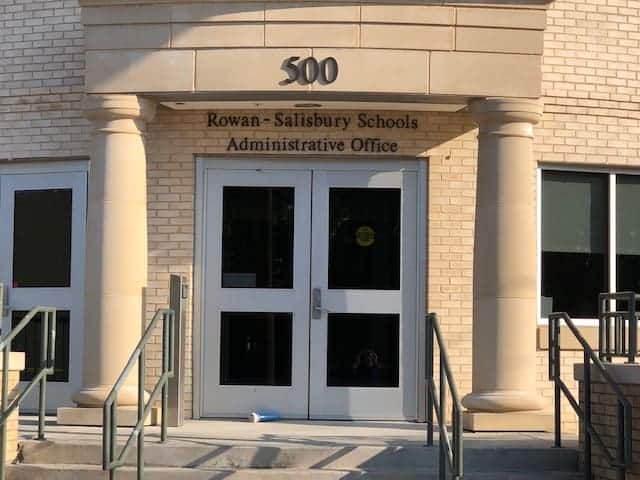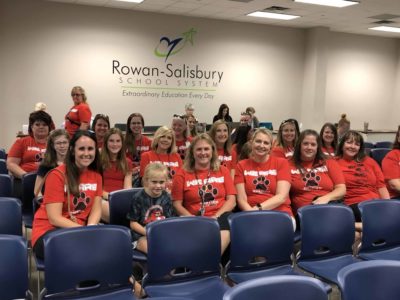

Rowan-Salisbury Schools is featured in a national report of 25 school systems with innovative practices by the School Superintendents Association, and the Successful Practices Network with the help of Houghton Mifflin Harcourt. The study started in 2017 and took over two years to complete, including extensive correspondence and site visits, according to Julie Morrow, assistant superintendent for curriculum and instruction for the district.
The study took a long view, spanning the district’s one-to-one technology initiative in 2014 through its designation as a low-performing district in 2015 and up through House Bill 986, which designated the district as a renewal district in 2018 and beyond. This designation gives charter-like flexibility to all schools in the district. Rowan-Salisbury is the first district in the state to have such flexibility.
With a 65% poverty rate and concentrations of English language learners in pockets of the district, Rowan-Salisbury Schools has its challenges. The study cites a “have no fear” culture for educators as well as extensive professional development to equip them to lead the one-to-one technology conversion in which each student has their own computer.
Following the technology implementation, the district reported increased student engagement and improved indicators of student outcomes despite having no additional state funding. In 2016, the district was removed from the state’s low-performing list, along with a majority of the individual schools.
These results intrigued lawmakers, and they discussed taking steps to enable Rowan-Salisbury to further improve student outcomes. House Bill 986 was passed in June 2018 and quickly approved by the local board of education.
Under renewal, each school can utilize flexibility in any or all of four areas: budget, calendar, curriculum, or personnel. They still must provide services to students with special needs, provide free and reduced lunches, and adhere to several other federally-mandated requirements for public schools.
The General Assembly has shown interest in offering similar flexibilities to other schools. For example, there has been discussion of allowing districts to establish their own school calendars, though there has been no action yet.
Rowan-Salisbury Schools is no longer required to adhere to the NC DPI Standard Course of Study as a renewal school system. A team of teachers from throughout the district met to identify the standards they consider fundamental. Fundamental standards for math and English have been identified; fundamental standards for science and social studies will be released to the public in the coming months.
Teachers are to focus on fundamental standards only, with some mention of other standards, to ensure that every student graduates with a thorough understanding of the basics.
In addition, the district is excused from kindergarten assessments and final exams, though they must still participate in End-of-Grade and End-of-Course testing.
The report cited Knollwood Elementary School as an early example of renewal flexibility. Principal Shonda Hairston used budget and personnel flexibility to reallocate funds from unfilled positions to use for out-of-town excursions for all grade levels. With almost 100% of her students qualifying for free- and reduced-priced lunches and more than 65% being English-learner students, she realized that many of her students had not experienced adventures outside of the county.
Kindergartners went on simple fishing trips while older grade levels adventured to mountains or beaches. Additional reading helped students understand the adventures they were taking.
The school also offers enhancement classes ranging from yoga and scrap-booking to STEM and media production. The district allowed personnel flexibility so that Hairston could hire staff with years of experience in these fields rather than certified teachers. While students in more affluent schools may learn enhancements in the private sector, Knollwood is able to offer them to students who likely could not afford private sector lessons.
All this has resulted in improvements in Lexile gains and scholarships for students. Scholarships throughout the district six years ago totaled almost $8 million; today that number exceeds $33 million.
The district must submit reports to the State Superintendent’s office in 2023 reviewing their progress as a renewal school system. The state will evaluate the report and decide whether to grant renewal status to other districts.
District Superintendent Lynn Moody was happy to be included among the top 25 innovative districts.
“[The School Superintendents Association] is one of the most well-respected educational organizations in the nation. It is not only an honor to be selected for this study on innovative practices, but by being selected, it illustrates the creative work being accomplished in Rowan-Salisbury to the world. I want to thank Dr. Julie Morrow, assistant superintendent for curriculum and instruction, for her participation in the interview study in order to share the work of our educators and students.”
Only one other district in the state was recognized by the study: Greene County, also a high-poverty district that strives to succeed despite the odds.
Read the entire report on Rowan Salisbury’s journey here.


